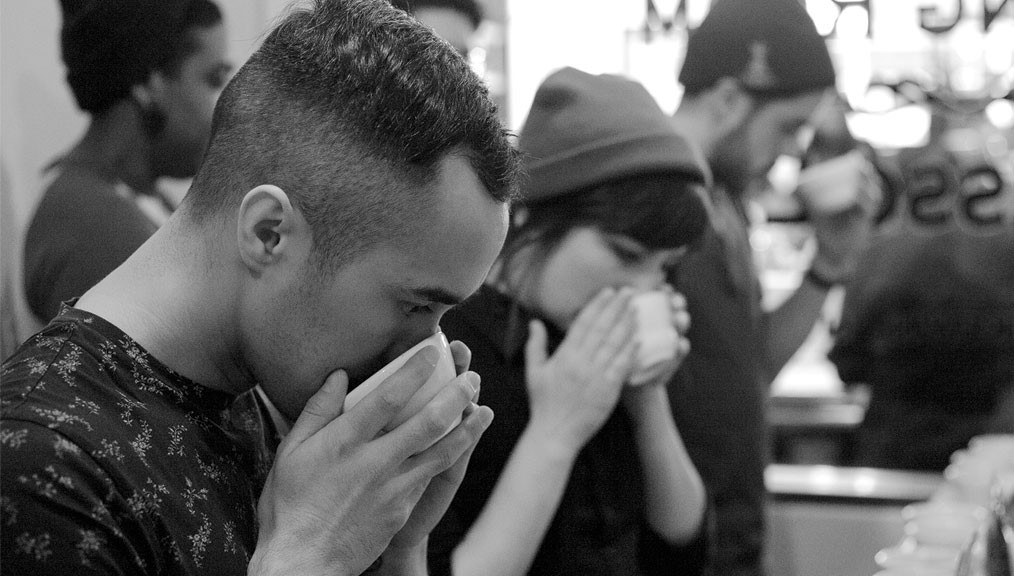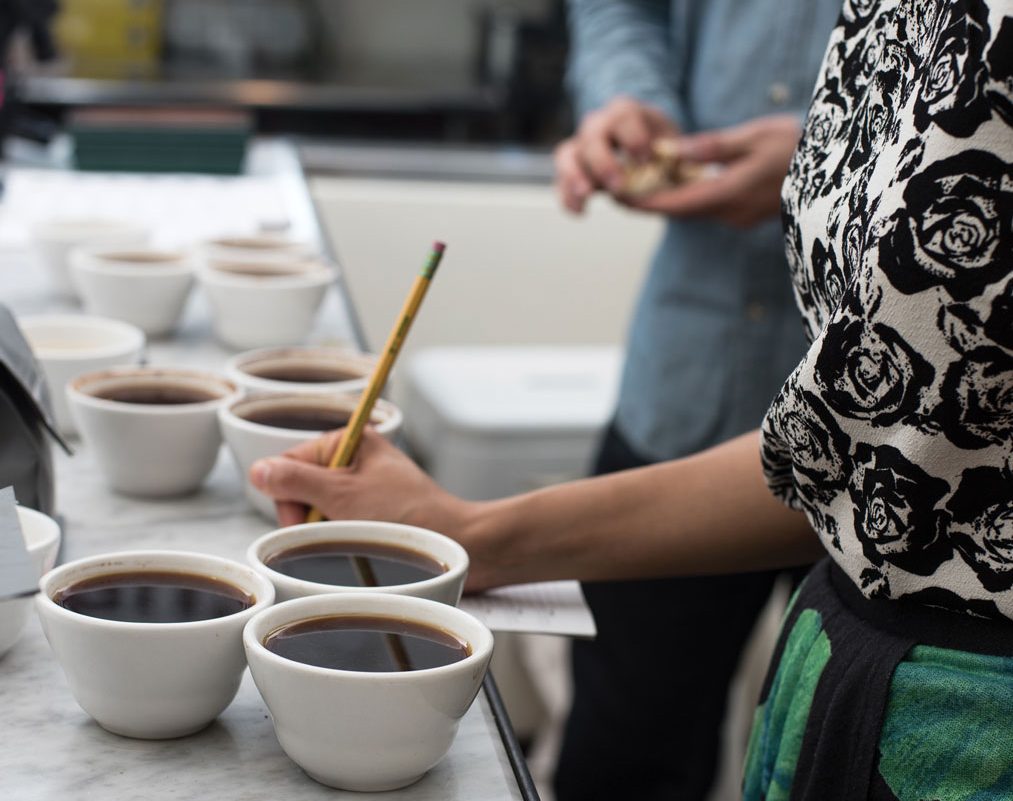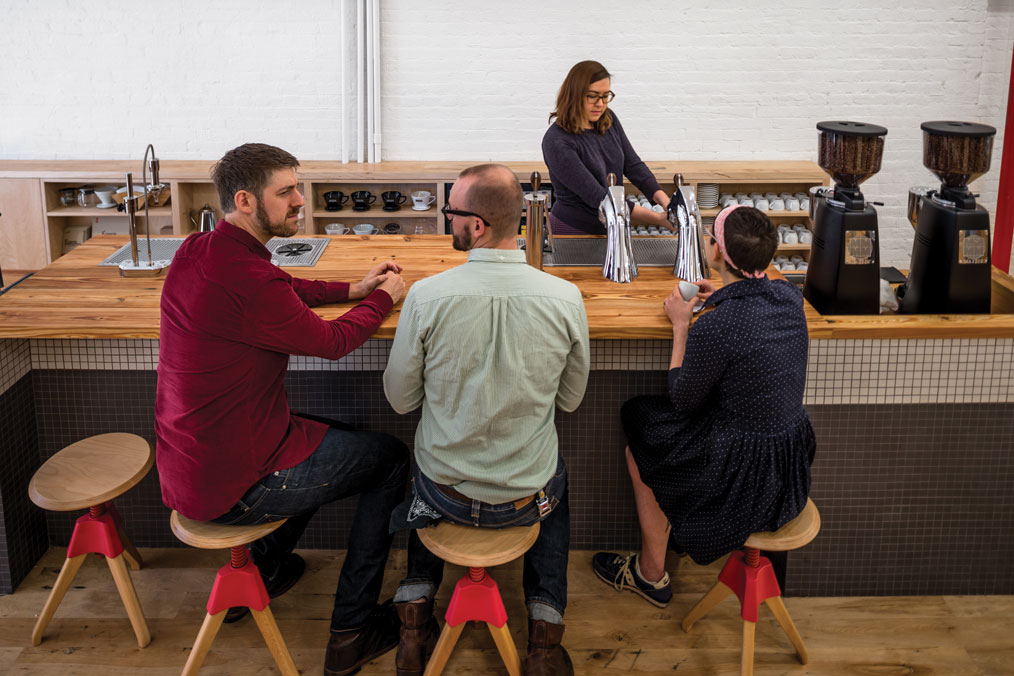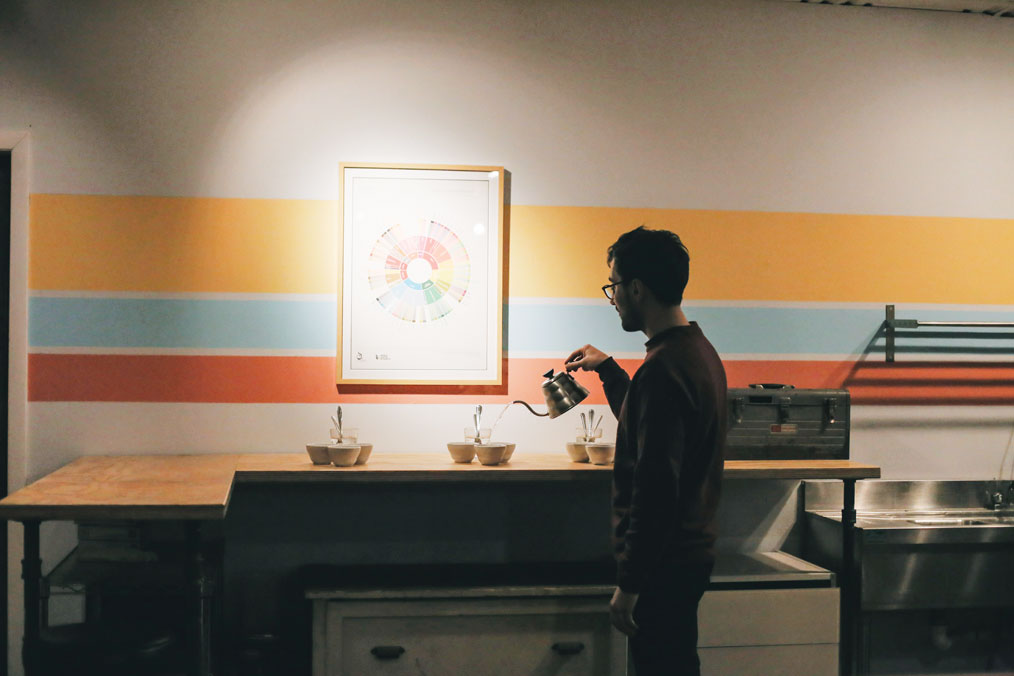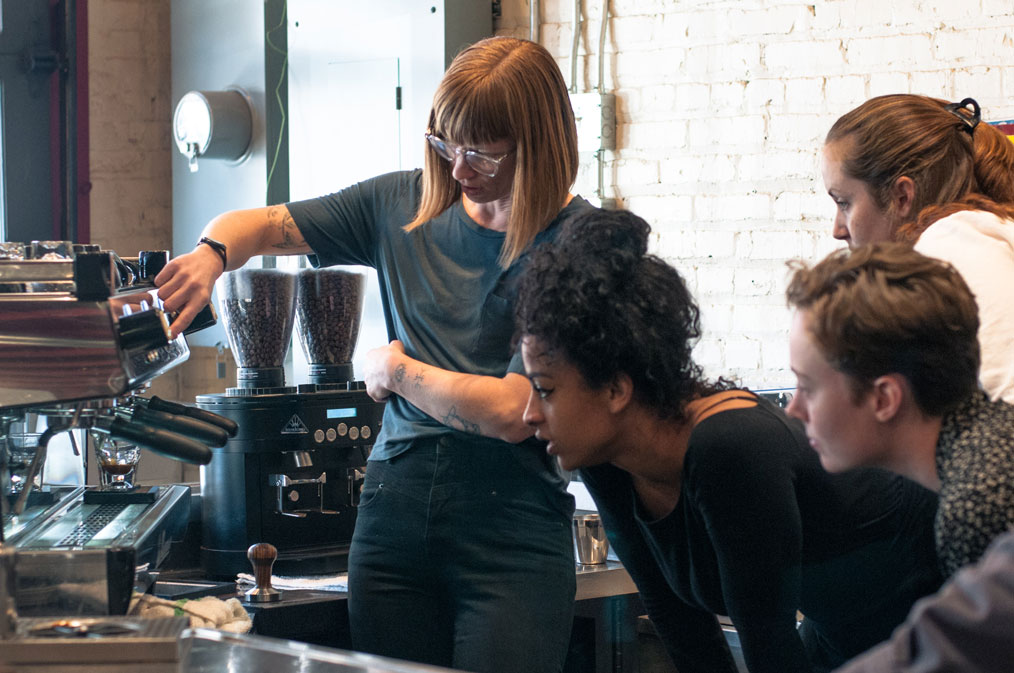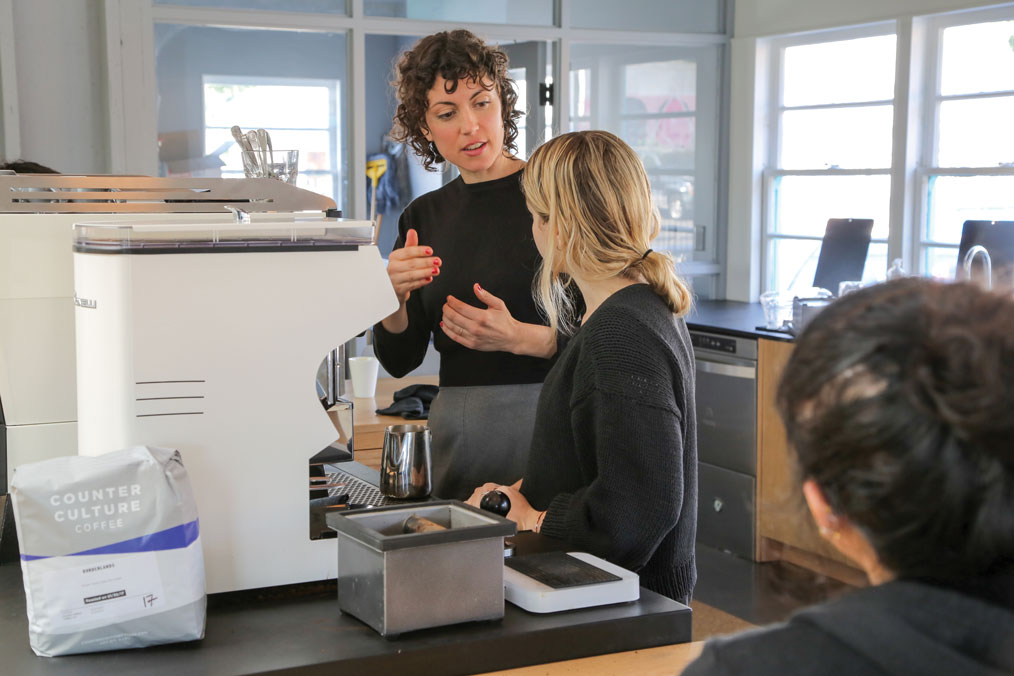(Photo: courtesy of Toby’s Estate.)
[A]t Counter Culture Coffee, education is an integral part of business. The Durham, North Carolina–based company has wholesale partners across the country, but no cafés of their own; providing resources to ensure proper brewing by clients and customers is critical to their growth and success.
The company’s Counter Intelligence Professional Development series caters to clients and staff, but they wanted an educational offering for curious customers, too. To reach casual coffee enthusiasts, the company began opening their training centers to the public.
For several years, Counter Culture has hosted coffee tastings open to the public every Friday morning at its eleven regional training centers. These cuppings, dubbed “Tastings at Ten,” provide an opportunity for outreach, consumer education, and product storytelling. Attendees learn more about coffee origins and have a platform to discuss various coffees with staff as they taste.
Counter Culture developed courses catering to coffee consumers in response to growing demand from home baristas. In the past, the public could join coffee pros in the same training classes, but the mix of enthusiasts and professionals just didn’t work. Wholesale clients had difficulty getting into classes, and it was clear that most home baristas didn’t have the same learning needs as professionals, or those with professional-grade equipment in their homes.
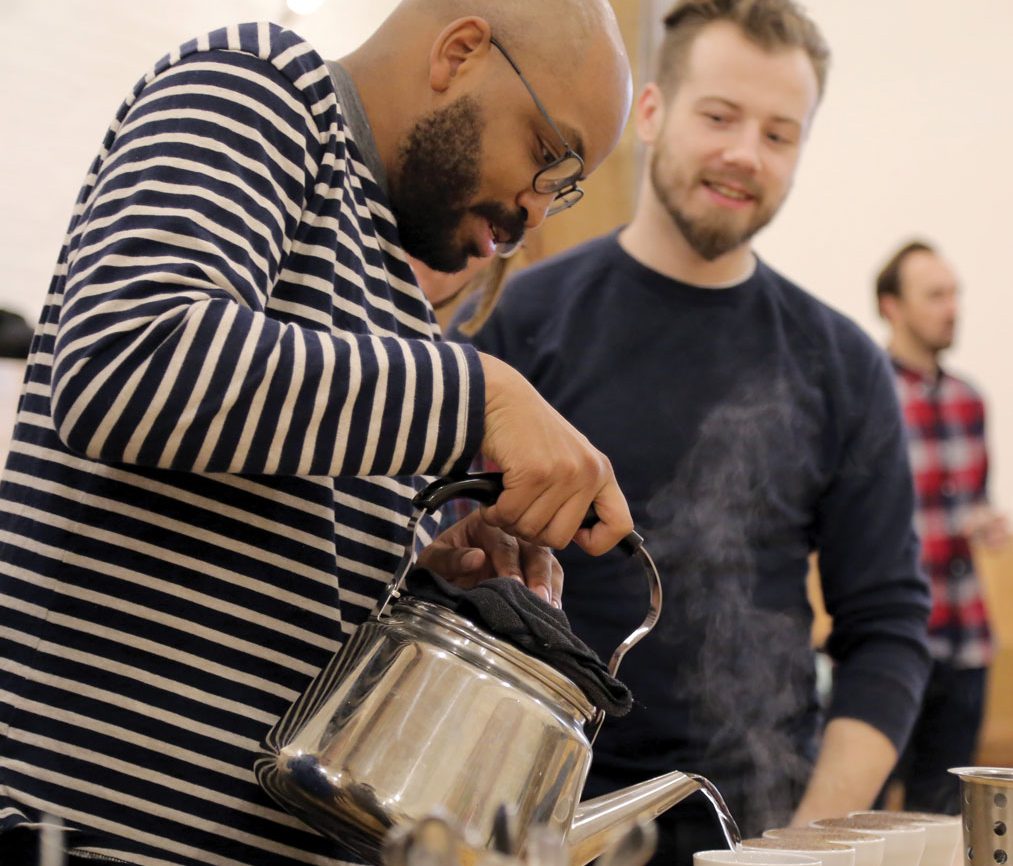
“When you have a class that is 90 percent professional and 10 percent home barista, or just an interested coffee enthusiast, it can be challenging to divide between those two audiences,” says Lydia Iannetti, consumer education and outreach manager.
The solution was to create Brewing Basics, which uses home kitchen-level equipment and teaches applicable content. Customers interested in an in-depth learning experience can take part in the two-hour Brewing Basics class, where students learn to use the Bonmac Pro Cone and delve into extraction basics. They walk away with the brewer, filters, and a coupon for Counter Culture’s online store. The class is offered one to three times per quarter at each training center, and it’s designed for six to ten participants. “For consumers, we wanted to offer in-person learning experiences but go beyond what we do every Friday. We wanted them to have an opportunity to actually learn from our instructors and get the hands-on experience with us,” Iannetti says.
Why go to the extra effort to provide public education at all?
“We don’t have a coffee shop that is a branded Counter Culture coffee shop. This is really our opportunity to reach the end-consumer in a way that we don’t otherwise have,” Iannetti says. “We wanted to be a part of the community where we were selling wholesale. We wanted to provide a dedicated space for learning for our wholesale customers but we also wanted to have a place that the public could come and learn about who we are, what we do, and what makes us different.”
Boosting Students’ Brewing Confidence
For companies with brick-and-mortar cafés, offering educational seminars can help staff reach customers on a more personal level—and provide an opportunity for staff and customers to connect over a shared love of coffee.
Toby’s Estate teaches one-on-one and small group classes in its Brew School in Brooklyn, New York, and Brew Parlor in Manhattan’s West Village. The classes—which include cupping, latte art, and espresso foundations—are open to all, with most students falling into the “non-professional coffee enthusiast” category.
The 101-level Home Brew Methods class attracts students (often couples) interested in stepping up their morning routine. The class includes an overview of three manual brewing methods the student would like to learn, with a goal to demystify the process of using manual equipment and accessories.
“We want students to leave with the feeling that brewing coffee can be a deeply satisfying ritual rather than a cumbersome chore,” says coffee educator Allie Caran.
Boosting students’ brewing confidence also includes helping them find methods that best fit their lifestyles, troubleshooting brewing issues, demonstrating how accessories like a gram scale can simplify their morning routine, and even assessing which coffee flavors they personally prefer.
The customized classes allow for individualized attention. “While the general outline of coffee theory remains the same, one-on-one classes allow us to customize these ideas and apply them to each person’s equipment, interests, and preferences while allowing for the most hands-on learning time possible,” Caran says.
The Brew School has an engaged customer base and plenty of repeat students, but building that audience was a process of trial and error over the last four years. “Most of the difficulties happened on the logistical side. We hadn’t established a set schedule. I think that being structure-less really created a problem,” Caran says. “It was very slow in the beginning. We struggled getting people to sign up.”
To help fill classes, Toby’s Estate created postcards announcing upcoming classes and placed them in prominent displays in their cafés. They also trained staff to talk about the classes with customers, and reconfigured the back-end of the website to simplify registration. Having dedicated space for classes was also an important factor in the training program’s success.
Toby’s Estate has also invested significant resources to make their programs successful; their staff includes four full-time educators. “We don’t take people off of our bar. At the end of the day, when it comes to public education, you need people who love to teach coffee. They’re not just great at it but they literally feel inspired to teach it,” Caran says.
Open for Curiosity
One of the major challenges—and often limiting factors—of hosting public cuppings and other seminars is space availability. It’s difficult to fit people into cramped quarters, and occupying too much space may compete with retail business.
Commonplace Coffee has six cafés in Pennsylvania—four in Pittsburgh and two in the city of Indiana. Their roastery is colocated inside a local brewery. On the brewery’s first floor is the lab space where Commonplace staff cup coffee and hold small trainings with wholesale clients and retail staff.
Because they’re renting space and have limited after-hours access—and because the lab space is physically small and often chaotic with a stream of brewery patrons—they no longer try to hold fee-based public classes there. Instead, the company hosts Open Lab, a free weekly cupping that also serves as a free-form open house for tastings and coffee talk.
“Open Lab exists for the sort of rare people who are really excited about coffee. They come, and they usually come with their own ideas. That’s what I really like,” says Nick Oddo, Commonplace’s director of engagement.
For example, one Open Lab faithful roasts coffee on his Huky at home and occasionally brings his samples in for cupping. “He’s able to cup and compare his coffees to our coffees and he talks about his roast profiles. He’s really picked up a lot of information,” Oddo says. Another customer brought the fruits of his coffee experiment—green coffee that he’s fermented, re-dried, and roasted in a popcorn roaster. “We cupped that coffee. That was super interesting. The people who showed up that day were really just blown away by it,” Oddo says.
In addition to home baristas, Oddo says people interested in becoming Commonplace wholesale clients can come to the lab space for a demo or tasting and ask questions. “We look at Open Lab as a service for people who are just curious, whether they want to make better coffee at home or they’re interested in opening up a coffee shop,” he says.
With the right space, available staff, and time, teaching coffee enthusiasts is a nice offering, but it’s certainly not a necessity for doing business.
“What does public education mean?” Oddo asks, considering the answer. “I’m not really sure, but I do know that coffee and talking to people, that’s what coffee is.”
The conversations, experimenting, and learning all enrich the Commonplace experience—for customers and employees alike.
“You want to have a space where curiosity can thrive,” Oddo says. “That’s why I like Open Lab. If you want to spend five minutes there, that’s OK.”
Building the Customer Base
Public education offerings can also be a way to grow business in communities that are just engaging with specialty coffee, allowing staff, prospective customers—even future employees—to grow their understanding of brewing practices.
Lamplighter Coffee Roasters found a slew of benefits to hosting public education programs in Richmond, Virginia, a market relatively untapped in terms of third-wave coffee businesses.
“We’re educating our customers and we’re building our customer base. The more people who come and learn more, the more it piques their interest and it makes them appreciate what we’re doing on a deeper level,” says Noelle Archibald, co-owner and coffee director of Lamplighter.
Revenue from the home barista classes also subsidizes the free training offered to wholesale clients and Lamplighter staff.
Like Counter Culture, Lamplighter originally tried comingling the classes but later decided to separate the learning tracks. “We were trying to make it so that a class is a class is a class and whoever is taking it is getting the same education, but what we found is that the needs of our staff, our clients, and the general public are sometimes really different,” Archibald says.
Running three cafés, a roastery, and a professional training program makes it difficult to find time and space to offer classes. Lamplighter rolled back their offerings for a time, but this year, they’re looking to rev those back up with some revisions. They’ll offer a new public class, which will be a synthesized version of the wholesale client and staff trainings that includes lessons on espresso extraction, milk preparation, and workflow. Instead of three four-hour classes, non-professionals can attend a single four-hour class.
That’s not to say that all non-professionals are just tinkering, though. “Typically people from the general public taking this class are people who want to open their own coffee shop one day,” Archibald says. “They want to get professional training or they’re moving to San Francisco and they want to work in coffee. Sometimes it’s because they want to get a job with us but they don’t have prior experience.” She adds that some students work at other local shops where training isn’t available. “It’s people going out on their own and paying because they have a sense of pride in what they’re doing.”
Addressing Challenges
Having skilled educators who understand the appropriate level of information for non-professionals, determining when to hold the classes and who should be in them, and dedicating space are all important considerations for a public education program.
Classes should also facilitate business growth and expansion, instead of creating financial hardship. When it comes to pricing and frequency of course offerings, determine what the time is worth. From staff time to the cost of keeping the café open for a small group, it’s critical to choose a price point that will make sense for the company’s overall business goals. Hours required for marketing and promotion also should be taken into consideration—and the reality that time spent on these programs can cut into training for wholesale clients or your own staff.
It’s also important to remember that coffee enthusiasts are just that—people who feel really passionate about coffee. Create a special experience for them that’s both educational and challenging.
“Don’t underestimate a coffee lover’s desire to learn,” says Counter Culture’s Iannetti. “Your audience is sophisticated and curious. They’re interested in learning from you because they appreciate your coffee or your service, and respect you and want to learn more.”
If you’re ready to dive into a public education program, stay flexible and be willing to readjust. Focus on your mission and use public classes as a real opportunity for education.
Caran, of Toby’s Estate, advises focusing on intentions. “If your intention is to make coffee magical and make coffee interesting, stick with it. And be prepared to stick with it for a long time, diligently,” she says. “You might have a public cupping that you offer once a week and nobody shows up for months. As frustrating as that can be, just keep doing it. Just don’t give up. It takes a while.”
—Willona M. Sloan is a freelance writer based in Washington, DC.



